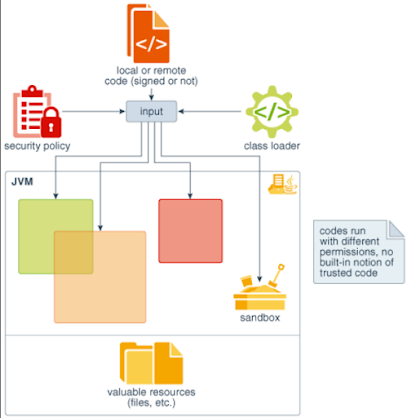Hello guys, Security is a paramount concern in software development, and choosing the right programming language can play a crucial role in mitigating potential vulnerabilities and threats. Java has long been celebrated for its security features and practices, making it a preferred choice for building secure applications and systems. In this article, we'll explore why Java is considered a secure programming language and examine the features and practices that contribute to its security reputation.
While Java's built-in security features are impressive, it's essential to acknowledge that security is a shared responsibility between the language and application developers.
That's all on why Java is considered a secure programming language. In conclusion, Java's security features, including bytecode execution in a sandbox, access control, immutability, and a strong classloader architecture, make it a secure programming language of choice for building robust and resilient applications.
Why Java is Considered a Secure Programming Language?
Here are a couple of reasons which make sense to understand why Java is considered as a secure programming language:1. Absence of Explicit Pointers
One of the fundamental reasons Java is considered secure is its absence of explicit pointers. In languages like C and C++, explicit pointers can lead to memory-related vulnerabilities like buffer overflows and pointer manipulation.In Java, memory management is handled by the Java Virtual Machine (JVM), which automatically manages memory and prevents direct access to memory addresses. This greatly reduces the risk of low-level memory exploits.
2. Bytecode Execution in a Sandbox
Java programs are executed within a Java Virtual Machine (JVM) that provides a secure sandbox environment. This sandboxing ensures that Java applications cannot access system resources or perform operations outside of their designated boundaries.The JVM enforces strict access controls, limiting the actions a Java program can perform.
3. Classloader's Sandbox Architecture
Java's classloader architecture contributes to its security. Each classloader instance has its own namespace, isolating classes from different sources. This separation is crucial for loading classes from local and network sources securely. It prevents classes from one source from interfering with or compromising classes from another source.4. Bytecode Verifier
Java employs a bytecode verifier that checks code fragments for illegal instructions or operations that could violate access rights to objects or system resources. This verification process adds an extra layer of security by ensuring that bytecode adheres to Java's safety rules.5. Security Manager
Java includes a Security Manager that determines what resources a class can access, such as reading and writing to the local disk, creating network connections, and more. The Security Manager allows fine-grained control over the permissions granted to Java applications, enhancing overall security.6. Immutability of String
Java's immutability of the String class is an often-overlooked security feature. Strings are immutable, meaning they cannot be changed after creation. This characteristic is particularly important when handling sensitive data like passwords.In contrast to mutable data structures, Strings in Java cannot be modified, reducing the risk of inadvertent data exposure. You can learn more about that on my earlier article Why String is Immutable in Java.
7. Access Control Functionality
Java enforces access control through keywords like public, private, and protected. These access modifiers allow developers to protect data and methods from unauthorized access, ensuring that only intended parts of code can interact with sensitive resources.8. Exception Handling
Java's robust exception handling mechanisms help identify and gracefully manage unexpected runtime errors. Proper exception handling prevents crashes and can also thwart certain security threats by not revealing sensitive information in error messages.9. Use of the 'final' Keyword
The final keyword in Java allows developers to mark classes, methods, and variables as immutable or non-extensible. This helps in securing critical code components from unintended modifications or extensions.10. java.security Package
Java provides a dedicated package, java.security, that offers classes and interfaces for building a comprehensive security framework. This package includes utilities for cryptography, authentication, and authorization, allowing developers to implement robust security measures in their applications.While Java's built-in security features are impressive, it's essential to acknowledge that security is a shared responsibility between the language and application developers.
Java provides a strong foundation for secure development, but developers must also follow security best practices, keep libraries and frameworks up to date, and stay vigilant against emerging threats.
That's all on why Java is considered a secure programming language. In conclusion, Java's security features, including bytecode execution in a sandbox, access control, immutability, and a strong classloader architecture, make it a secure programming language of choice for building robust and resilient applications.
By leveraging these features and adhering to security best practices, developers can confidently develop Java applications that withstand a wide range of security challenges.
Other Java Tutorials from Javarevisited you may like





No comments:
Post a Comment
Feel free to comment, ask questions if you have any doubt.